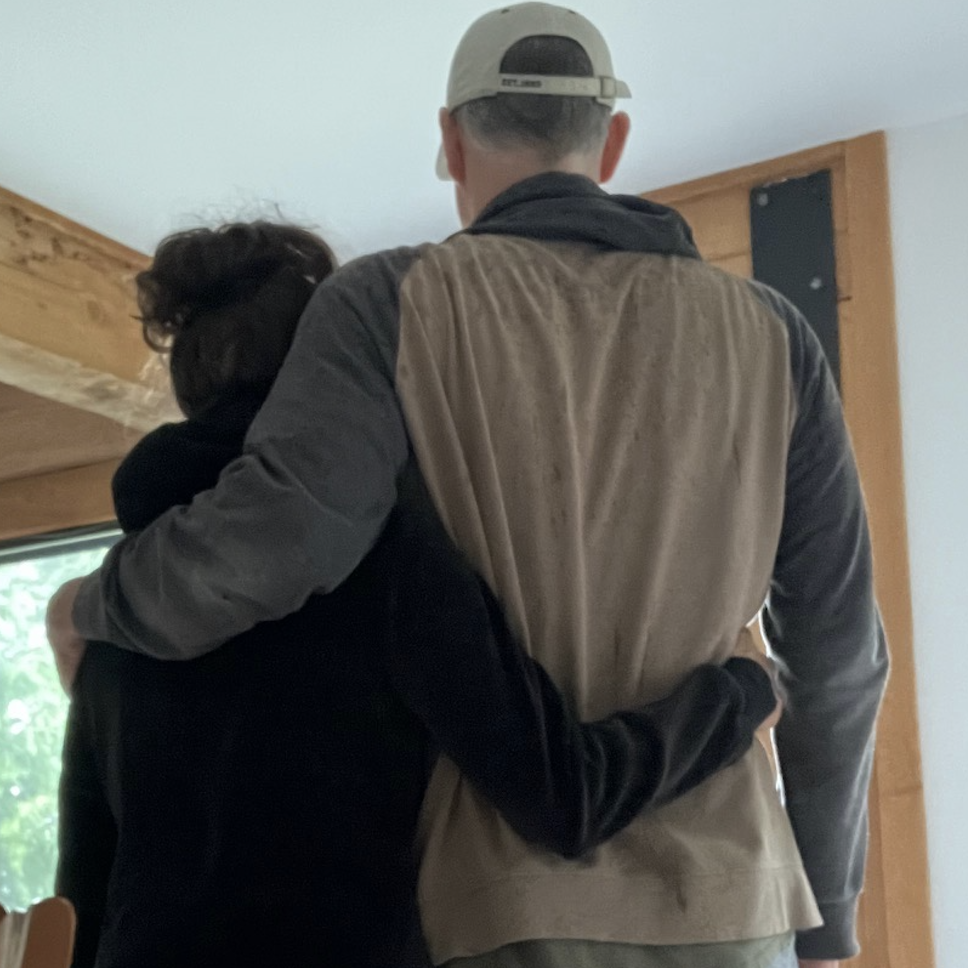Episode Transcript
[00:00:04] Speaker A: Shmoopy.
[00:00:05] Speaker B: Hi.
I'm eating chocolate.
[00:00:08] Speaker A: Of course you are.
I don't think I've ever met a man who eats more chocolate than you.
This man has chocolate covered almonds with his coffee every freaking morning of his life.
[00:00:24] Speaker B: Almost pretty much.
[00:00:25] Speaker A: No, for real. No, not pretty much. Jesus, look your mouthful. Okay. We want to talk about small things.
[00:00:33] Speaker B: Okay.
[00:00:34] Speaker A: What are the small things you can do to make you feel better? Every day this world is overwhelming.
A little scary.
Thank you for my tea.
[00:00:46] Speaker B: You can think about one nice thing you could do for someone else every single day.
Even if you're on your own or I want to say lonely. But if you're on your own and you're out and about, do something nice for somebody.
[00:01:02] Speaker A: I believe I'd like to push that further.
When we do something for someone, it takes us out of our own way.
[00:01:12] Speaker B: Right?
[00:01:13] Speaker A: When I'm not feeling super hot, you know what I do?
[00:01:16] Speaker B: Oh, when does that ever happen?
[00:01:17] Speaker A: Oh, shush. When I don't feel so good, I give love. I spread love. That's my motto. Spread love.
I send notes in the mail, homemade cards.
I leave little text messages or voicemails to people that I love.
I tell them how much they mean to me.
That makes me feel good.
[00:01:40] Speaker B: And when you're spreading your love, is there usually some tetracycline or penicillin on hand?
[00:01:45] Speaker A: Oh, shush.
Why do you always go there?
[00:01:50] Speaker B: No, I agree with you. That's.
That's. Yeah. Focus on someone else's.
I don't want to say situation, but just.
[00:01:59] Speaker A: No, no, no, no, no.
[00:02:00] Speaker B: Turn yourself outward.
[00:02:02] Speaker A: It's not exactly. I think that's the better way to say it is.
It's not about focusing on someone else's situation or disregarding your own. I think it's more about putting.
Sharing whatever your gift is with other people.
So then you get outside yourself. Wow. I'm not saying that properly.
[00:02:29] Speaker B: Well, you're not thinking about all the crap. You're feeling good, you're sharing joy. Joy.
[00:02:40] Speaker A: Sharing joy.
[00:02:41] Speaker B: By the way, for someone that's done DV work a lot in the past for the visually impaired and have worked with the blind and visually impaired.
[00:02:50] Speaker A: Yeah.
[00:02:51] Speaker B: When you slap my hand like that.
[00:02:54] Speaker A: What does it mean?
[00:02:54] Speaker B: We have to describe what took place because they don't know. But in this case, everyone is blind or visually impaired because it's audio only.
So I have to say, I'm flapping your hand.
Isn't that cool?
So if there's a clunk or something.
[00:03:14] Speaker A: This is my cup of Tea.
[00:03:17] Speaker B: Setting it down.
[00:03:18] Speaker A: That's right. Are we doing a mini DV trial at the same time as dv, by the way, is descriptive video.
[00:03:25] Speaker B: Right.
[00:03:26] Speaker A: Both of us have done it before.
It's fabulous.
[00:03:31] Speaker B: Yeah, it's really cool. In both countries, the United States and Canada. Of course, this might get thrown out now. Who knows? For God's sakes. But.
[00:03:41] Speaker A: Oh, stop. We gotta stop saying that. We're gonna get thrown out.
[00:03:44] Speaker B: No, we're not gonna get thrown out. The law that requires what I'm about to tell you might get thrown out. Because why not? Like everything else that's semi decent?
[00:03:52] Speaker A: Okay.
[00:03:55] Speaker B: They pass laws that all past TV shows and movies and new. Obviously, TV shows and movies have to have described video for the blind, vision.
[00:04:04] Speaker A: Impaired audience, which is, I think, fantastic.
[00:04:06] Speaker B: Right. Just kind of like, close that. Closed captioning for the deaf. Deaf. Thank you.
Hard of hearing or hard of hearing?
Yeah, I don't know if that terminology's changed again, but. Oh, well, they have DV for the blind and it's mandatory, so it's kind of a business. Yeah, but you'd be surprised. I'm not sure about the United States, but I was shocked. How many people in Canada, of The, what, approximately 35 million people that live in the country.
[00:04:41] Speaker A: Yeah.
[00:04:42] Speaker B: Something like 6 or 7 million have some type of visual impairment.
[00:04:48] Speaker A: Really?
[00:04:48] Speaker B: Yeah.
[00:04:49] Speaker A: Wow.
[00:04:49] Speaker B: In some way, shape or form. Yeah. Pretty crazy.
[00:04:52] Speaker A: That's like a fifth. Mm.
[00:04:55] Speaker B: That seemed like a lot to me.
[00:04:57] Speaker A: That's me doing math.
[00:04:58] Speaker B: What are you doing? Math. But, you know, this is also you saying goodbye.
[00:05:01] Speaker A: Bye.


